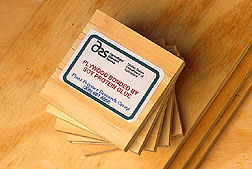Foaming Soy Adhesives Could Help Soybeans Bond With Lumber Industry
|
||
|
A new soy-based plywood glue stands ready to give the plywood industry what every industry wants: faster production at lower cost. To achieve this, ARS researchers at the National Center for Agricultural Utilization Research (NCAUR) in Peoria, Illinois, are using soy to replace animal blood protein in plywood glue formulas.
"Concerns about animal blood's limited supply and about health issues prompted our search for alternative protein extenders," says ARS research associate Milagros Hojilla-Evangelista, who's in the Plant Polymer Research Unit in Peoria. Extenders are substances added to an adhesive to reduce the amount of resin required. The plywood glues were designed to be applied by "foam extrusion," which is one of four conventional ways the industry applies glue to wood. As part of their evaluations, Hojilla-Evangelista and ARS technician Rick Haig checked each experimental formulation for its foaming ability, refoaming ability, foam strand quality, and adhesive properties. The United Soybean Board provided funding for this project. |
|
|
NCAUR researchers tested three different soy glue formulations by varying the amount of soy extender, adding either soy flour or soy concentrate.
Soy flour—at 22 cents per pound—makes the best glue, and the glue ends up being 50 cents per 100 kilograms cheaper than conventional formulations. Soy flour makes up 3.5 to 5.5 percent of the glue mix, with the adhesive resin being the primary component. Soy flour can't be used one for one in place of blood protein in glue because soy flour contains less protein than the animal blood. With soy flour, the researchers found that more is less: Increasing the amount of soy flour produced glue that foamed better at less cost. "We have to get the amount of soy just right to produce a glue that will foam as well as conventional glue and, at the same time, be as adhesive," says Hojilla-Evangelista. "Other benefits of our foamed soy-based glue are that it requires less drying time, uses less water, and produces less waste than conventional plywood glues." The new glue could create an additional domestic market for nearly one-half million bushels of soybeans annually. Pacific Adhesives Co., in Portland, Oregon, is testing the three soy-based glue formulas in pilot trials. These tests are an intermediate stage between the laboratory and mill trials, which use the actual volume of glue required for a day's work. "Early results have confirmed our laboratory findings about foaming properties and adhesive quality. Mill trials are being conducted with one of the formulations," says Hojilla-Evangelista. There are 11 plywood mills in North America using foam extrusion technology: two each in Louisiana and Washington and one each in Idaho, Oregon, Montana, Arkansas, Mississippi, Texas, and British Columbia. The newest foam extrusion system was installed last year in Hamina, Finland, and is the first plywood mill in that country to convert to foam extrusion application because of Finland's new pollution regulations.—By Linda McGraw, Agricultural Research Service Information Staff. This research is part of New Uses, Quality, and Marketability of Plant and Animal Products, an ARS National Program (#306) described on the World Wide Web at http://www.nps.ars.usda.gov. Milagros P. Hojilla-Evangelista and Rick Haig are in the USDA-ARS Plant Polymer Research Unit, National Center for Agricultural Utilization Research, 1815 N. University Street, Peoria, IL 61604; phone (309) 681-6350, fax (309) 681-6691. |
|
|
"Foaming Soy Adhesives Could Help Soybeans Bond With Lumber Industry " was published in the January 2001 issue of Agricultural Research magazine. |
||








